Thursday August 21: Passu – Kashgar
It is a long day’s trek to Kashgar in China, so we were up and off early. Mind you, it’s as well it was daylight as there was sill no electricity!
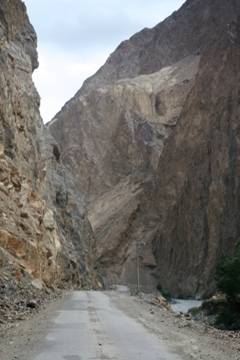 First we drove
to Sost where our minibus driver was waiting for us. Ehsan is not permitted to
take his jeep into China, so for the trip over the Khunjerab Pass you either go in the daily bus, or else hire a private minibus. Ehsan advised the private
minibus for the trip up as it is more spectacular direction, and the daily bus
back. He had negotiated a price of £60 (payable in sterling please!) for the
journey from Sost in Pakistan, over the Khunjerab and down to Tashkurgan. The
minibus drivers, who are all employed by the Northern Areas Transport Company
(NATCO – who run the buses all over Northern Pakistan) and have a special
permit to allow them to drive as far as Tashkurgan or Kashgar.
First we drove
to Sost where our minibus driver was waiting for us. Ehsan is not permitted to
take his jeep into China, so for the trip over the Khunjerab Pass you either go in the daily bus, or else hire a private minibus. Ehsan advised the private
minibus for the trip up as it is more spectacular direction, and the daily bus
back. He had negotiated a price of £60 (payable in sterling please!) for the
journey from Sost in Pakistan, over the Khunjerab and down to Tashkurgan. The
minibus drivers, who are all employed by the Northern Areas Transport Company
(NATCO – who run the buses all over Northern Pakistan) and have a special
permit to allow them to drive as far as Tashkurgan or Kashgar.
The road up to the pass rises steadily, though the last 4-5km are much steeper, through gorges and scenery that simply gets more and more spectacular – even more landslides, even narrower, even more glaciers. About half way to the top of the pass you enter the Khunjerab National Park which is principally a way of collecting fees, ie. income from foreigners. Most people who travel through the park never see any wildlife, so we were lucky as we saw Marco Polo Sheep (very rare), Ibex, Yaks and Marmots.
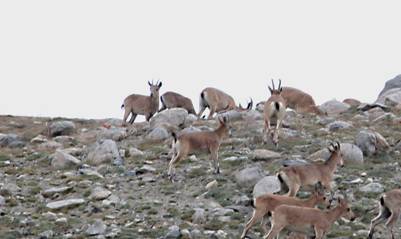
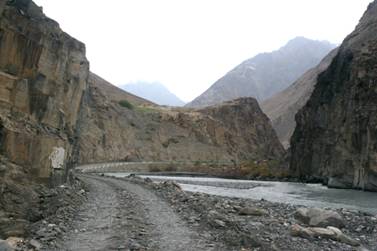
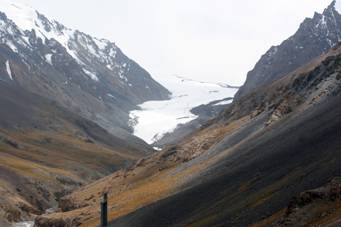
Note how good the KKH is at this point!
Then suddenly the scenery changes as you get to the top of the pass at 4934meters (16,400ft) as the mountains here and in China are the Pamirs which, being much older than either the Himalayas or the Karakorams, are much more rounded and the valleys are wider and more gentle. The friendly guard at the Pakistan post at the top, where it was sleeting, stamped our passports and we had officially left Pakistan. The China border post (but NOT the immigration post, which is 25 miles away in Tashkurgan) is about a mile down the hill.
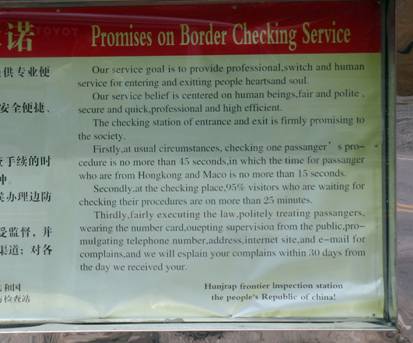 The
Chinese were completely paranoid – presumably because of the recent deaths in
Kashgar and the Olympics, and the whole entry process was both a shambles and a
disgrace. Believe me, walking and carrying cases at over 16,000ft is hard work,
and b****y cold. We had to take our cases out of the minibus into a grotty shed
with one stove for warmth and there the Chinese guards went through everything
in our cases and our bags. They were completely flummoxed by some of the kit,
especially the piezo-electric bite zapper – try explaining that to a Chinese
guard who doesn’t speak English! We thought that having had our baggage passed
as OK, we would be allowed on our way – oh no! We had to wait another 2 ½ hours
till there were another three minibuses to form a convoy down to Tashkurgan,
and it was b****y freezing cold. The only facility (!!!) worse than the
inspection shed was the toilets which consisted of three holes in the ground in
another shed, covered with flies (at 16,000ft too !) and which smelled so
strongly and so bad that I advised Margaret to squat down between the wheels of
some of the lorries. One bus-load of Pakistanis were carrying rolls of carpets
to sell in the Kashgar bazaar and they had to unroll each and every one of
them! The sign at the post says that the whole process should take no longer
than 25 minutes, but we were kept there for 2 ½ hours; this and the standard of
the place either shows that the Chinese don’t give a s**t about anyone else,
or, more likely, think that the normal travellers (ie. Pakistanis) are so
inferior they need not bother. Note
how awful the translation is!
The
Chinese were completely paranoid – presumably because of the recent deaths in
Kashgar and the Olympics, and the whole entry process was both a shambles and a
disgrace. Believe me, walking and carrying cases at over 16,000ft is hard work,
and b****y cold. We had to take our cases out of the minibus into a grotty shed
with one stove for warmth and there the Chinese guards went through everything
in our cases and our bags. They were completely flummoxed by some of the kit,
especially the piezo-electric bite zapper – try explaining that to a Chinese
guard who doesn’t speak English! We thought that having had our baggage passed
as OK, we would be allowed on our way – oh no! We had to wait another 2 ½ hours
till there were another three minibuses to form a convoy down to Tashkurgan,
and it was b****y freezing cold. The only facility (!!!) worse than the
inspection shed was the toilets which consisted of three holes in the ground in
another shed, covered with flies (at 16,000ft too !) and which smelled so
strongly and so bad that I advised Margaret to squat down between the wheels of
some of the lorries. One bus-load of Pakistanis were carrying rolls of carpets
to sell in the Kashgar bazaar and they had to unroll each and every one of
them! The sign at the post says that the whole process should take no longer
than 25 minutes, but we were kept there for 2 ½ hours; this and the standard of
the place either shows that the Chinese don’t give a s**t about anyone else,
or, more likely, think that the normal travellers (ie. Pakistanis) are so
inferior they need not bother. Note
how awful the translation is!
The pass by the Chinese post is broad a grassy, and would be quite attractive if you weren’t stuck there.

It was never entirely clear to me whether I was allowed to take photographs or not – some of the soldiers didn’t seem to mind, whilst others made aggressive actions at the very sight of a camera.
So, after having been there for 2 ½ hours the Chinese
finally deemed that four buses was enough for a convoy and so they dispatched a
guard with us in our minibus to go with us to Tashkurgan. Fat lot of good he
was as he fell asleep within two minutes and slept the whole 25 miles down to
Tashkurgan. At Tashkurgan we were all driven into the customs area where the
whole palaver of rummaging through cases and the Pakistanis unrolling their
carpets was repeated. Then finally we were driven 100yards to the next building
(you couldn’t make this up!) and once again we had to lug out our cases and
this time they were put through an airport style X-ray machine – talk about
‘belt and braces’. Goodness knows what the Pakistanis had to do with their
carpets as we 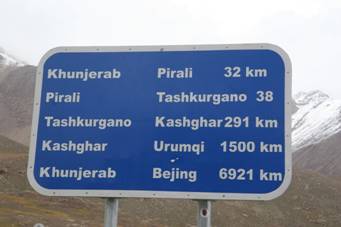 sort-of made a
fuss and were processed first. So, finally six hours after getting to the
top of the Khunjerab Pass, we at last had our passports stamped and were
officially in China. You have no idea how good it was to meet up with Quing Li
our driver/guide.
sort-of made a
fuss and were processed first. So, finally six hours after getting to the
top of the Khunjerab Pass, we at last had our passports stamped and were
officially in China. You have no idea how good it was to meet up with Quing Li
our driver/guide.
By this time, it was gone 18.00hrs and poor old Quing Li had been waiting for four hours. He is an Uighur, who speaks English, but not all that well, and I think he was embarrassed by the whole entry palaver, still, he is Uighur and the whole entry process is run by Han Chinese. Quing Li was keen that we have something to eat, but since it was a 4+ hour drive on to Kashgar, we decided just to have a snack of bread and fruit.
At this point a few words should be said about time in China. Officially the whole country is on ‘Beijing time’ as the authorities don’t seem to be capable of coping with the concept of Time Zones that every other large country manages. However, as Beijing is the equivalent of three hours ahead of Kashgar, the Kashgaris sensibly adopt the concept of ‘Kashgar Time’, and this time is used for day-to-day dealings. However, this does mean that you have to be a bit careful to ensure which ‘time’ you are using if you make an appointment. Also, certain ‘official agencies’ like the railways and the post office have to run on ‘Beijing Time’, the latter simply open and close apparently very early! If I mention time in this narrative, it will refer to ‘Kashgar Time’.
Almost as soon as we set off (in the Mitsubishi Pajero) it started to rain, and absolutely chucked it down for the next 40 miles or so, by which time it was well dark, nevertheless, till it was totally dark, we could see that there were lots of glaciers coming off the mountains. The road then entered about 60 miles of gorges through some mountains. In the gorge section there were a further two police/army road checks where we had to show our passports – no getting out the cases though. You sort-of forget that this area too is a sensitive one for the Chinese – not only is it the border with Pakistan, but at one point the road goes within 14 miles of the Tajikistan border – all the neighbours are Muslims, as are the Uigars and the other Muslim minorities in China who are none too happy about being subjugated by the Han Chinese, and whatever the Han Chinese say, the Uighurs, Tajiks and Uzbeks are clearly second class citizens in their ‘own country’.